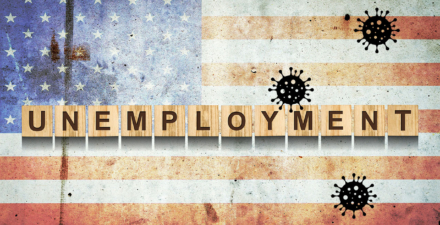Statement on Pandemic Unemployment Compensation
Washington, DC – When Congress passed the CARES Act in March, leaders of many progressive organizations supported their efforts to provide relief to millions of people across America, while acknowledging that the CARES Act was an initial step, but wholly insufficient on its own, to address the massive economic crisis catalyzed by COVID-19. In the ensuing months, the Trump administration has continued to mismanage the response to the virus, and, as a result, the pandemic has worsened, the economic crisis is ongoing, and the need for continued relief to families across the country is as urgent as ever.
Federal Pandemic Unemployment Compensation (PUC), which is giving tens of millions of unemployed workers a $600 per week boost in unemployment income, has helped ease the pain of this crisis by providing much-needed income to families during an economic crisis and has boosted the economy overall. Every week for the last four months, more than twice as many workers have filed for unemployment insurance than during the worst week of the Great Recession. Meanwhile, cases of COVID-19 are once again rising across the country, and we still lack unified national leadership to give direction and stability in these unprecedented times. Congress must extend enhanced unemployment benefits or risk economic calamity.
Unemployment Insurance is keeping the economy afloat. This $600 boost to unemployment benefits has helped millions pay rent, buy groceries, and keep the lights on. Slashing workers’ incomes now, by any amount, before it is safe to go back to work—and while there are still more than 3 times as many unemployed workers as job openings—will further hurt demand. Any cut will mean millions of families will have less to spend at grocery stores, restaurants, and other businesses, which will catalyze a second wave of layoffs and compound economic hardship across the country. Cutting unemployment will cause irreparable harm, shrink the economy, and cost us millions more jobs over the next year. To ensure this aid does not turn off before the crisis has fully abated, Congress should tie the program to objective economic indicators like state unemployment rates rather than arbitrary deadlines that create counter-productive, last-minute political haggling.
Cutting Unemployment Insurance is an attack on Black and brown workers. Black and brown workers have been disproportionately harmed by all aspects of this crisis, including higher infection rates and higher unemployment rates than their white counterparts. This is especially true for Black and brown women, who are overrepresented in the hardest hit industries. PUC has been a crucial lifeline for Black and brown families, effectively keeping millions out of poverty. Cutting this support now would be economically devastating to communities of color, most acutely women of color, who, due to structural racism, already have less of a financial cushion to rely on.
Unemployment Insurance is saving lives. Our first priority in a global pandemic needs to be peoples’ health. Unemployment benefits help keep families and the economy from financial collapse while it’s still too dangerous to reopen businesses and send people back to work. We’ve seen that reopening before the pandemic is under control will not help us in fighting the spread of the virus or with economic recovery.
We are the economy. As long as families and communities across the country are struggling, our economy will struggle. Congress must act swiftly to avoid the economic damage that will be caused by cutting the income of tens of millions of workers amid an unprecedented pandemic and economic crisis.
We also urge Congress to pass legislation that meets the historic scale and scope of this crisis. That means that in addition to UI, Congress must provide other urgent relief to keep the economy afloat, including state and local aid, recurring checks, an extension of rent moratoriums and mortgage delays, emergency standards for worker health and safety and premium pay for workers risking their lives to work, childcare support, permanent paid leave and earned sick days, and increased SNAP and food assistance payments. Large, bold investments accompanied by inclusive structural reforms are urgently needed for workers, families, and communities—the real drivers of our economy—to navigate this crisis.
The following leaders signed this statement:
Maurice BP-Weeks, Action Center on Race and the Economy
Neera Tanden, Center for American Progress
Eileen Applebaum, Center for Economic and Policy Research
Brian Kettenring, Center for Popular Democracy
Deborah Weinstein, Coalition on Human Needs
Dorian Warren, Community Change Action
Sabeel Rahman, Demos
Thea Lee, Economic Policy Institute
Natalie Foster, Economic Security Project
Chris Hughes, Economic Security Project
Taylor Jo Isenberg, Economic Security Project
Indi Dutta-Gupta, Georgetown Center on Poverty and Inequality
Michael Linden, Groundwork Collaborative
Adam Krauthamer, Local 802 AFM
Kristin Rowe-Finkbeiner, MomsRising
Rahna Epting, MoveOn
Rebecca Dixon, National Employment Law Project
Fatima Goss Graves, National Women’s Law Center
Sister Simone Campbell, NETWORK Lobby for Catholic Social Justice
George Goehl, People’s Action
Felicia Wong, Roosevelt Institute
Mary Kay Henry, Service Employees International Union
Nathan Williams, Town Hall Project
Heather Boushey, Washington Center for Equitable Growth
###
The Washington Center for Equitable Growth is a nonprofit research and grantmaking organization dedicated to advancing evidence-backed ideas and policies that promote strong, stable, and broad-based economic growth. For more information, see www.equitablegrowth.org and follow us on Twitter and Facebook @equitablegrowth.



